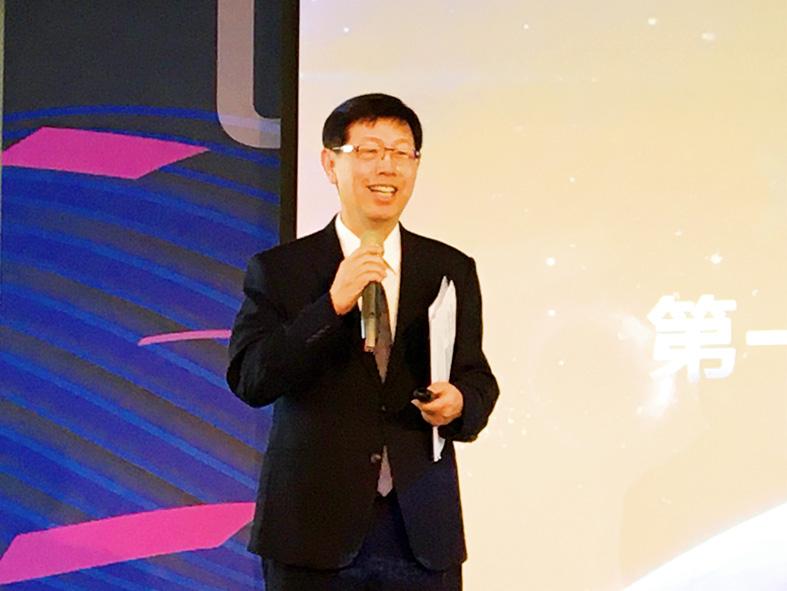Hon Hai Precision Industry Co (鴻海精密) has been shifting its focus toward developing quantum technology, which it sees as vital to creating Taiwan’s next miracle in the semiconductor industry, the company said on Saturday.
In its first quantum technology forum held in Taipei, Hon Hai chairman Young Liu (劉揚偉) said the company, also known as Foxconn Technology Group (富士康科技集團) in the global market, established a quantum computing research institute in June as part of its efforts to enter the field.
When he first heard of quantum-powered computers in 2014, Liu did not know exactly what the technology was, he said, adding that it was not until November last year that he began to learn about its use in blockchain applications and Hon Hair started putting resources toward it.

Photo: CNA
In the field of physics, a quantum is the minimum amount of any physical entity involved in an interaction.
As of September, US$21.9 billion had been invested globally in quantum technology, Liu said, adding that the Ministry of Science and Technology has pledged to invest NT$8 billion (US$282 million) in quantum technology development over the next five years.
Hon Hai’s quantum technology institute would develop advanced core technologies over the next three to seven years, Liu said.
“Driven by quantum technology development, Taiwan’s electronics sector will enter a new era,” said Liu, who had led the company’s semiconductor initiatives before he was appointed chairman last year. “With the new technology, Taiwan will create a miracle in its semiconductor industry.”
One of the initiatives of Hon Hai’s quantum computing research institute is its Q-Hub lab project, which was launched in collaboration with National Taiwan University’s physics department, Liu said, adding that Chung Yuan Christian University has also been working with Hon Hai to offer quantum technology-related courses.
The quantum technology institute is expected to collaborate with public, private and academic sectors to build Taiwan’s capability in the area and work with a pool of 60 experts in the field, he said.
On the business outlook for the global information communication technology sector next year, Liu said he was upbeat about emerging technologies such as 5G applications, servers and electric vehicles in the first half of the year.
However, the development of the global economy would depend largely on the effectiveness of COVID-19 vaccines, he said.
In the past few years, Hon Hai has been working to expand from solely hardware manufacturing into software development, to boost its profitability, Liu said.
In the initial phase of diversification, Hon Hai’s gross margin is expected to increase by 1 percentage point to 7 percent, and when the upgrade is completed, the margin will likely rise to 10 percent by 2025, he said.

Taiwan’s rapidly aging population is fueling a sharp increase in homes occupied solely by elderly people, a trend that is reshaping the nation’s housing market and social fabric, real-estate brokers said yesterday. About 850,000 residences were occupied by elderly people in the first quarter, including 655,000 that housed only one resident, the Ministry of the Interior said. The figures have nearly doubled from a decade earlier, Great Home Realty Co (大家房屋) said, as people aged 65 and older now make up 20.8 percent of the population. “The so-called silver tsunami represents more than just a demographic shift — it could fundamentally redefine the

The US government on Wednesday sanctioned more than two dozen companies in China, Turkey and the United Arab Emirates, including offshoots of a US chip firm, accusing the businesses of providing illicit support to Iran’s military or proxies. The US Department of Commerce included two subsidiaries of US-based chip distributor Arrow Electronics Inc (艾睿電子) on its so-called entity list published on the federal register for facilitating purchases by Iran’s proxies of US tech. Arrow spokesman John Hourigan said that the subsidiaries have been operating in full compliance with US export control regulations and his company is discussing with the US Bureau of

Businesses across the global semiconductor supply chain are bracing themselves for disruptions from an escalating trade war, after China imposed curbs on rare earth mineral exports and the US responded with additional tariffs and restrictions on software sales to the Asian nation. China’s restrictions, the most targeted move yet to limit supplies of rare earth materials, represent the first major attempt by Beijing to exercise long-arm jurisdiction over foreign companies to target the semiconductor industry, threatening to stall the chips powering the artificial intelligence (AI) boom. They prompted US President Donald Trump on Friday to announce that he would impose an additional

Pegatron Corp (和碩), a key assembler of Apple Inc’s iPhones, on Thursday reported a 12.3 percent year-on-year decline in revenue for last quarter to NT$257.86 billion (US$8.44 billion), but it expects revenue to improve in the second half on traditional holiday demand. The fourth quarter is usually the peak season for its communications products, a company official said on condition of anonymity. As Apple released its new iPhone 17 series early last month, sales in the communications segment rose sequentially last month, the official said. Shipments to Apple have been stable and in line with earlier expectations, they said. Pegatron shipped 2.4 million notebook